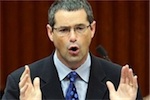 I’ve been very busy this week following Tuesday’s announcement that mandatory ISP-level Internet “filtering” will go ahead, writing stories for Crikey and ABC Online.
I’ve been very busy this week following Tuesday’s announcement that mandatory ISP-level Internet “filtering” will go ahead, writing stories for Crikey and ABC Online.
Two stories for Crikey:
- Conroy’s internet filter: so what? Senator Conroy’s claim that “ISP-level filtering of a defined list of URLs can be delivered with 100% accuracy” is perhaps true in a narrow technical sense, but it misrepresents the Enex TestLab report. And it ignores Enex’s finding that “a technically competent user could, if they wished, circumvent the filtering technology.â€
- Internet filtering: first step on the path to Burma? Not just my fear, but that of retired High Court Justice Michael Kirby. I also point out how the existing censorship system has extended the definition of Refused Classification — that is, banned material — three times in the last decade, often without public consultation. Such scope creep is a worry.

And my first outing for ABC’s The Drum — well, for Unleashed, there’s still some unresolved branding issues — is Evidence-based policy? Not on this filter! I argue that the mandatory filtering program isn’t about “protecting the children” at all.
A sample:
If the plan were really about protecting the children, and if it were really evidence-based, the government would have first have figured out what risks children actually face — online and everywhere else. They’d then figure out the best methods of countering those risks. Then they’d figure out the most cost-effective ways of implementing those solutions.
If we did that, we’d probably find that the risks are the very same ones that child protection experts keep banging on about. Bullying by their peers. Abuse from within their own homes and families. Poverty and its associated health risks. Obesity.
But this is politics, not child protection.
This policy is probably about a Senate preferences deal between Labor and Family First. It’s certainly about the political demands of a small but vocal and well-connected minority of conservative Christian voters and the devilishly evil internet.
The political solution has already been chosen: compulsory censorship by an automatic filter. The political goal is to sell that policy to the voters.
The comments threads on all articles is revealing fascinating stuff. Please read. And comment.
That’s all link to my recent stuff. In part 2 I’ll link to some of the other clever writing on this issue.

